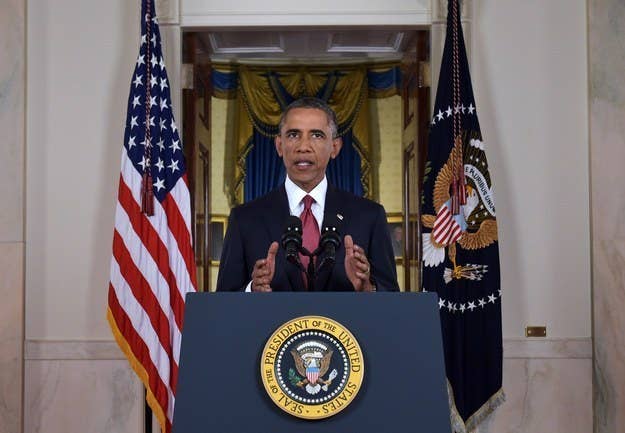
Last night President Obama said he already had the "authority" to carry out strikes on ISIS in Iraq and Syria. In a background briefing with reporters a senior government official explained exactly what authority the president was referring to: the 2001 AUMF.
Lawyers on both the right and the left, including some who used to work in the Obama administration, were shocked. Robert Chesney, a professor of national security law at the University of Texas, wrote in a quick reaction post that the decision was "just stunning from a legal perspective." In a post titled "Democracy's Failure," Jennifer Daskal, a lawyer who once worked for the Obama administration, called the interpretation "implausible" and a case of "politics over law." Writing for Time, Jack Goldsmith, a former attorney for the Bush administration, called it "presidential unilateralism masquerading as implausible statutory interpretation."
Rarely in today's deeply divided world of bipartisan politics do so many lawyers speak so forcefully and with such unison. The reasons we are seeing this sort of legal unanimity is because of what David Cole, writing in the New York Review of Books called "a presidential sleight of hand."
The 2001 Authorization for Use of Military Force was passed on Sept. 14, 2001, three days after the worst terrorist attack in U.S. history. In it, Congress authorized the president "to use all necessary and appropriate force against those nations, organizations, or persons he determines planned, authorized, committed, or aided the terrorist attacks."
In those emotional first days, as I wrote in my narrative history of the 60-word sentence that makes up the body of the AUMF, Congress didn't even know for certain who had carried out the 9/11 attacks, which is why the text didn't mention al-Qaeda or the Taliban. The dead were still being counted and the craters were still smoking. Since then, however, that single sentence has been used to justify all manner of things, from drone strikes in Yemen and Somalia to SEAL raids in Libya. Even Guantanamo Bay rests upon the legal foundation of those 60 words.
But as the Bush administration gave way to the Obama administration the elasticity of those words seemed to have been stretched far beyond their original intent. Both presidents had used them to target and kill not only al-Qaeda and the Taliban, but also a catchall category of individuals and groups known as "associated forces" — two words that were nowhere in the original authorization. Indeed, many of the organizations labeled "associated forces" didn't even exist on 9/11, but the U.S. claimed it could target them based on their links to al-Qaeda.
In May 2013, early in his second term, Obama promised to change all that. In a speech at the National Defense University, he said that he would work to "refine and ultimately repeal" the AUMF. Obama also pledged not to "sign laws designed to expand this mandate further." Because, as he explained at the time, "this war, like all wars, must end."
That promise evaporated last night. By invoking the 2001 AUMF, Obama greatly expanded the power of those 60 words. Basically, as Steve Vladeck pointed out on Lawfare, the president is claiming that "ISIS is al-Qaeda," despite the fact that al-Qaeda has publicly expelled ISIS and at times has even clashed with the group.
Last year Ayman al-Zawahiri, the head of al-Qaeda, said that ISIS is "is not a branch of al-Qaeda." In a background briefing with reporters one administration official said that didn't matter. Even though ISIS and al-Qaeda had split, the president could still attack ISIS as if it were al-Qaeda all based on a single sentence written 13 years earlier at a time when ISIS didn't exist.
"The president," the official said, "may rely on the 2001 AUMF as statutory authority for the use of force against (ISIS), notwithstanding the recent public split between AQ's senior leadership and (ISIS)."
If — 13 years after it was passed — the AUMF can be read in such a broad and expansive way, then it begs the questions: What military strikes do those 60 ambiguous words not permit?
